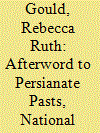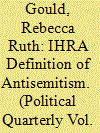| Srl | Item |
| 1 |
ID:
185883


|
|
|
|
|
| Summary/Abstract |
What is the relevance of the Persianate as a category of analysis in a world wherein even world literature continues to be framed as the literary history of discrete nations? First coined by historian Marshall Hodgson in 1974, Persianate initially referred to cultures such as Georgian, Armenian, Chaghatay, Urdu, and Ottoman, which were heavily influenced lexically and culturally by Persian without themselves being related to Persian linguistically. Gradually, an additional meaning was grafted onto “Persianate,” which referenced cultures such as Judeo-Persian that were linguistically Persian but culturally diverse, bearing multiple alphabets, religions, and identities. These two meanings—the first grounded in cultural affinity and the second in linguistic origins—complement each other and ensure that the concept of the Persianate is reducible neither to language nor to identity.
|
|
|
|
|
|
|
|
|
|
|
|
|
|
|
|
| 2 |
ID:
176082


|
|
|
|
|
| Summary/Abstract |
The IHRA definition is one of the most contentious documents in the history of efforts to combat antisemitism. Although it first became well known in the UK as a result of disputes within the Labour Party, the definition reaches well beyond that context, and has been adopted by universities, city councils, and governments. With its intensive focus on the critique of Israel as a marker of antisemitism, the IHRA definition has been heavily implicated in the suppression of Israel‐critical speech in recent years. This article is among the first to adopt a global perspective on the definition—both its history and its content—clarifying the political stakes of this definition and broader paratextual apparatus for a general audience, and provides an explanation of why it should be rejected rather than used to censor Israel‐critical speech.
|
|
|
|
|
|
|
|
|
|
|
|
|
|
|
|